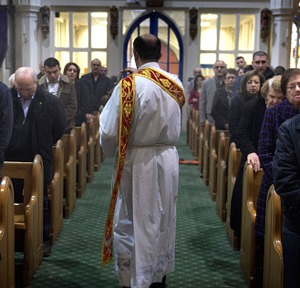My sevenyear old daughter had to fill in a school form the other day, requiring her to name her religion. "Protestant," she declared, without a moment's hesitation. This shocked me. It sounded, somehow, a touch militant for a child raised outside Belfast. True, my own roots are sturdily nonPapist, and my wife is a Baptist Minister. But she attended a Convent School, and learned history from a Member of the Society of Jesus who told her that Martin Luther was "a genuine reformer who went wrong." Ecumenical and openminded is how we see ourselves.
I mention this only to make the point that it is difficult to step outside one's own cultural prejudices about religion. Misrepresenting other people's religious beliefs and practices appears to be a core human need.
The Jesuits, certainly, are no strangers to colourful misrepresentation. Jonathan Wright's history of the Jesuits revolves around an attempt to understand how it could have been that the Vatican's most loyal, energetic and gifted evangelists found their precious Society suppressed by the Pope himself, Clement XIV to be precise, in 1773. Wright notes that the papal notice failed "to make any specific accusations against the Jesuits" but argued that the Society's abolition was "necessary for the sake of Christian peace."
According to Wright, the Jesuits were largely victims of a mythology they had partly helped create. This endowed them with more political influence than they usually possessed, although they were indeed often confessors to the rich and powerful, and which generalised from the moral failures of individual priests to make the word 'Jesuitical' an enduring label for a wily hypocrisy.
To the Jesuits' great credit, says the author, were a highly curious internationalism (especially orientalism) not always tainted by alliance with colonial intent, accomplishment in science and linguistics and a commitment to education which has been impressive in its scale and passion for nearly 500 years.
It is, Wright argues, crudely wrong to see the Jesuits as victims of a rationalising enlightenment which exposed their manipulative mumbojumbo of saints, martyrs, relics and miracles. Rather, he says, Jesuit power receded as other Catholic rulers on the European mainland rejected Rome's temporal authority and threw out the Jesuits who were, by their own proclamation, the Pope's most loyal emissaries. The Pope sacrificed the Jesuits in order to appease neighbouring rulers. The Jesuit suppression "was largely about politics."
Ironically, during the period of suppression, the Jesuit flame was kept flickering inside Catherine the Great's Russia, but by the time that Europe's first wave of revolutionary wars receded in 1815, and the Society was restored to Papal approval, Jesuits were confronting a world so transformed by technology and social aspiration that they all but lost their political bearings.
Marginalised in Europe's Protestant countries, Jesuits remained suspected in 19th century France and of no relevance in the emergent secular republic of the United States. In the 20th century, their fear of Goddenying Bolshevism made them insufficiently hostile to continental Fascism, though in more recent years some Jesuits have engaged strongly, and at great personal cost, with the 'liberation theology' movement in South America and elsewhere. Equally, a Jesuit theologian, Teilhard de Chardin, has been a formative thinker on the spiritual aspects of ecological issues: a green priest.
Wright takes the view that these confusions and selfexaminations have enabled the Jesuits to play a significant role in designing the "decidedly impressive" architecture of contemporary Catholic social teaching, with its emphasis upon justice and a careful balance of individualism and communitarianism. This he sees as the latest outworking of a history which involves a "collision between contingency and enduring tradition."
Those who find the Catholic Church's teaching problematic on, say, gender and sexuality, will think this a generous conclusion, but the author is right that a globally ambitious, supranational organisation which has lasted five centuries and exerted such a powerful appeal to artists, statesmen, scientists, explorers and business people may yet have some insights in store for those prepared to pay attention. Who knows, perhaps even the spiritual exercises of Ignatius Loyola, the Society's first great leader, will find new friends in a world rancid with unreality television.
Today, the Society of Jesus is much reduced. There are slightly more than 20,000 Jesuits worldwide, which is not much more than half the number of 35 years ago.
If the poet and cleric John Donne were alive today, he would probably still taunt Jesuits as "eunuchs" with no "apprehension and capacity of worldly estates" but who retain "the lust, and itch and concupiscence, to be conversant therein". How annoying for Protestants and Humanists that some of the most zealously pious Catholics insist upon trying to understand the world.
The Jesuits is available from Amazon (UK)

